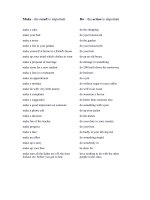make or do (BBC)
Bạn đang xem bản rút gọn của tài liệu. Xem và tải ngay bản đầy đủ của tài liệu tại đây (111.42 KB, 5 trang )
The confusion arises because finished operates both as anadjective and as the past
tense and past participle of the verb to finish.
So if your colleagues say 'We're finished for today', they are using it as an adjective.
If they say 'We've finished work for today', they are using it as the past participle of the
verb to finish. (This would be more normal in standard English).
-ed as an adjective
When we use it as an adjective, we can talk about thingsbeing finished as well
as people being finished with something:
• Their marriage is finished. It was a disaster from the beginning, so it's good it's
over.
• She's not ready to leave. She won't be finished for at least another hour and a
half.
• Sheila wasn't finished with Paul yet. They still had a lot to talk about.
There are, of course, a wide range of adjectives ending in -edwhich follow the verb to
be and other linking verbs such asseem, appear, look and become. Here are a few of
the most common:
• I became interested in the tennis as soon as I heard that ticket prices would be
reduced.
• I was bored with the performance and decided to leave as soon as the interval
arrived.
• She seemed surprised - even amazed - to see me. She thought I was in the
States.
• They were quite satisfied with the arrangement. Sharing the cost suited them
both.
• Ned was frightened of Lucie. He was also worried that they might be late back.
Note that all of these adjectives ending in -ed describe people'sfeelings, mental
states or emotional reactions to something. There are many more. Check those you
don't know in adictionary to see how they are used and which prepositions they can be
used with:
amused, appalled, confused, delighted, disappointed, excited, pleased, puzzled, shocked,
tired, concerned, convinced, determined, prepared, thrilled
-ing as an adjective
There are also a large number of adjectives ending in -ing which relate to verb
forms and are used in the same way as -edadjectives.
Note that these adjectives usually describe things rather than people directly, although
they also describe the effect that something has on your ideas and feelings:
• The meeting was very satisfying for all concerned as everybody got what they
wanted.
• The play was quite interesting and commented on many aspects of contemporary
life.
• These results, Tom, are disappointing and must be very worrying for your
parents.
• I don't want to go to the seaside again this year. It's boring.
• His answers were misleading. In fact, everyone thought he was lying.
Here are some more which can be used in the same way. All of these -ing adjectives
listed here have their -ed counterparts:
alarming, amusing, annoying, astonishing, charming, confusing, convincing, depressing,
disgusting, embarrassing, encouraging, entertaining, humiliating, inspiring, intriguing,
refreshing, rewarding, tempting, terrifying, thrilling
Remember:
• The storm was terrifying. I was terrified by it.
His offer - three weeks in the Caribbean with nothing to pay! - is tempting and I am
tempted to accept it.
When or if?
We use when for things that are certain to happen in the future:
• I'll buy you a pair of gloves when I go shopping this afternoon.
I'll give you a ring when I get home from school.
Note that although the reference is clearly to the future, we use the present tense in the
when-clause.
We use if for things that may happen and which we are not certainabout:
• If I decide to come to London this year, I'll come and visit you.
• I'm going to call the police if she's not back within the hour.
• If you make the salads, I'll prepare the barbecue.
In all of these examples, we are talking about future conditions and whether we
use when or if depends upon the certainty of things happening.
However, when and if are interchangeable when we are talking about general
conditions that always apply when if means almost the same as whenever. Compare the
following:
• I keep the air-conditioning on at night if the temperature goes above 30 degrees.
• I keep the air-conditioning on at night whenever / when the temperature goes
above 30 degrees.
• If the green flag is flying, it's quite safe to swim here
You can swim here whenever / when / provided the green flag is flying.
In case
We use in case to talk about taking precautions, doing something because something
else might happen:
• During the drought, keep the bath filled with water - just in case it is needed.
• I've bought some candles in case there are more electricity cuts.
• In case I forget, remind me to check the tyre pressure before we load up the car.
In case or if?
When we use in case we are mostly describing future possible situations. When we
use if we are talking about conditions that apply. Compare the following and note
the differences in meaning.
• I'll fill up the car with petrol in case you need to go to Brighton. ( = I'll fill up
now, because you might need it later.)
• I'll fill up the car with petrol if you need to go to Brighton. ( = Let me know if you
need to go to Brighton and then I'll fill up with petrol.)
• Take the mobile phone with you in case the car breaks down.
If the car breaks down, give me a ring.
in case of
Note that in case of is a prepositional phrase used with a nounwhich is similar in
meaning to an if-clause. Compare the following:
• In case of fire, exit from the building by the stairs. Do not attempt to use the lift.
• If there is a fire, leave the building via the stairs. Don't try to use the lift.
In cases of difficulty, phone this help line.
If you experience any problems, phone this help line.
do
You do an exam. But there are no easy rules to follow. We always use do to describe
indefinite activities, often with what,thing, anything, nothing, etc and generally
speaking we also use do to talk about duties, jobs or (leisure) activities. Look at the
following examples:
• 'What shall we do now?' 'You can do what you like. I'm going home!'
• 'He didn't do anything. He just sat there.'
• 'You expect me to do everything around the house. Well, I'm fed up!'
• 'I did all my homework last night so tonight I'm going to dothe housework.'
• 'I did a lot of research and I think I did a good job on that essay. I did my best
anyway.'
'I intend to do lots of walking on holiday this year, and perhaps some bird-watching too.
make
We tend to use make when we are talking about constructing, creating or performing
something. Study the following examples:
• 'I made three suggestions and left it to him to make the final decision.'
• 'I've made all the arrangements for the trip and I've madea great effort to get it all
right.'
• 'I'm afraid I'm going to have to make my excuses and leave.'
'I have to make three phone calls
make or do?
Test your knowledge of make and do now by clicking on what you think is the correct
box in the examples that follow.
It is not always as easy as the above examples suggest. It is often simply a matter of
usage, of learning and knowing which of these two verbs collocate with which nouns.
Best of luck! The first two examples are done for you.
1 make do the cleaning and the cooking
2 make do a lasting impression (on someone)
3 make do the shopping and the washing-up
4 make do some serious work
5 make do a lot of damage (to something)
6 make do an announcement or a speech
7 make do an application (e.g. for a driving test)
8 make do a sound or a noise
9 make do one's hair or one's teeth
10 make do a lot of harm rather than good
11 make do business (with somebody)
12 make do (somebody) a favour
13 make do love, not war
14 make do a mess, a profit or a fortune
15 make do fun of someone or a fool of someone
16 make do amends for one's behaviour
Answers
do the cleaning and the cooking
make a lasting impression (on someone)
do the shopping and the washing-up
do some serious work
do a lot of damage (to something)
make an announcement
make an application (e.g. for a driving test)
make a sound or a noise
do one's hair or one's teeth
do a lot of harm rather than good
do business (with somebody)
do (somebody) a favour
make love, not war
make a mess, a profit or a fortune
make fun of someone or a fool of someone
make amends for one's behaviour









